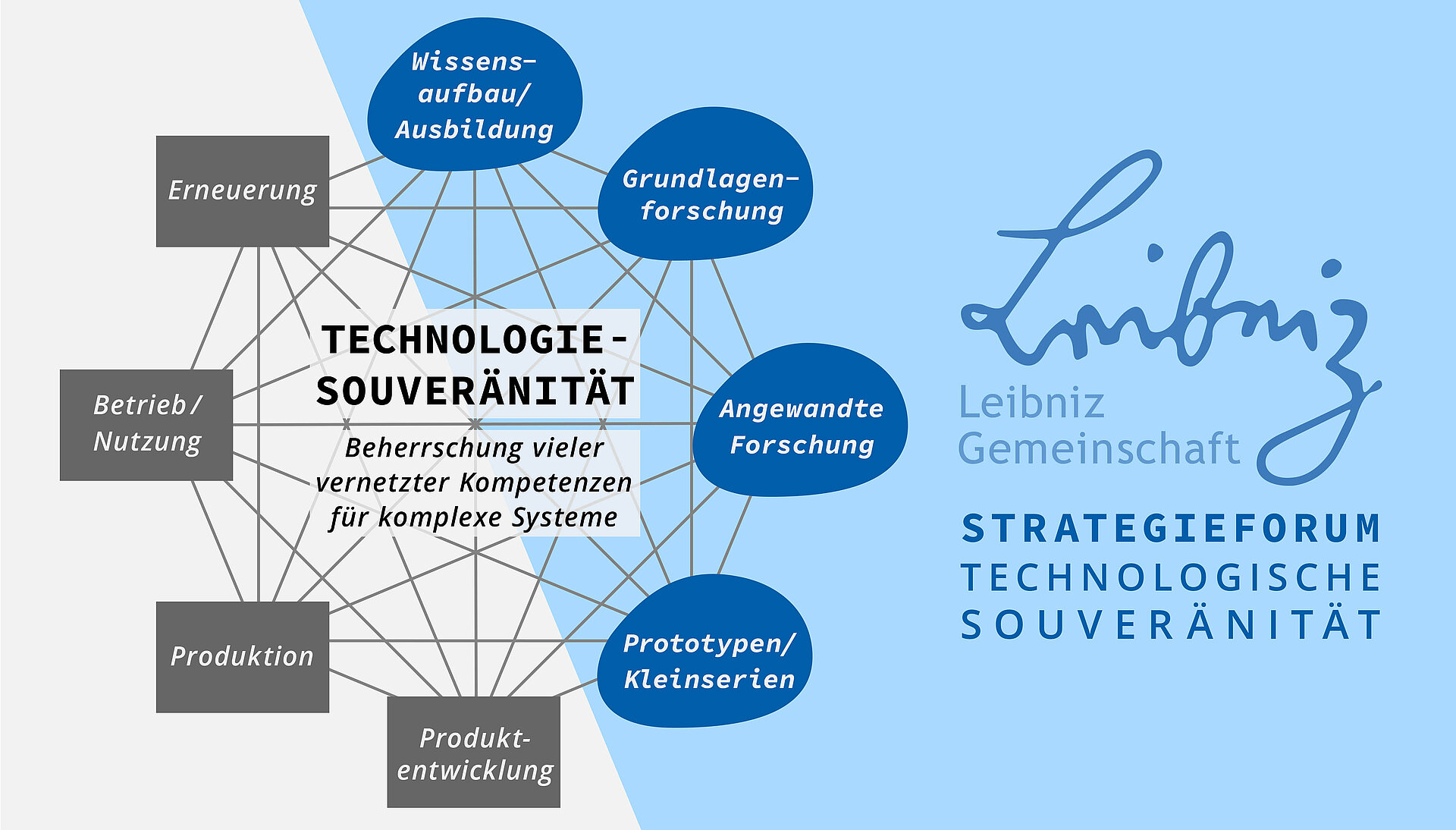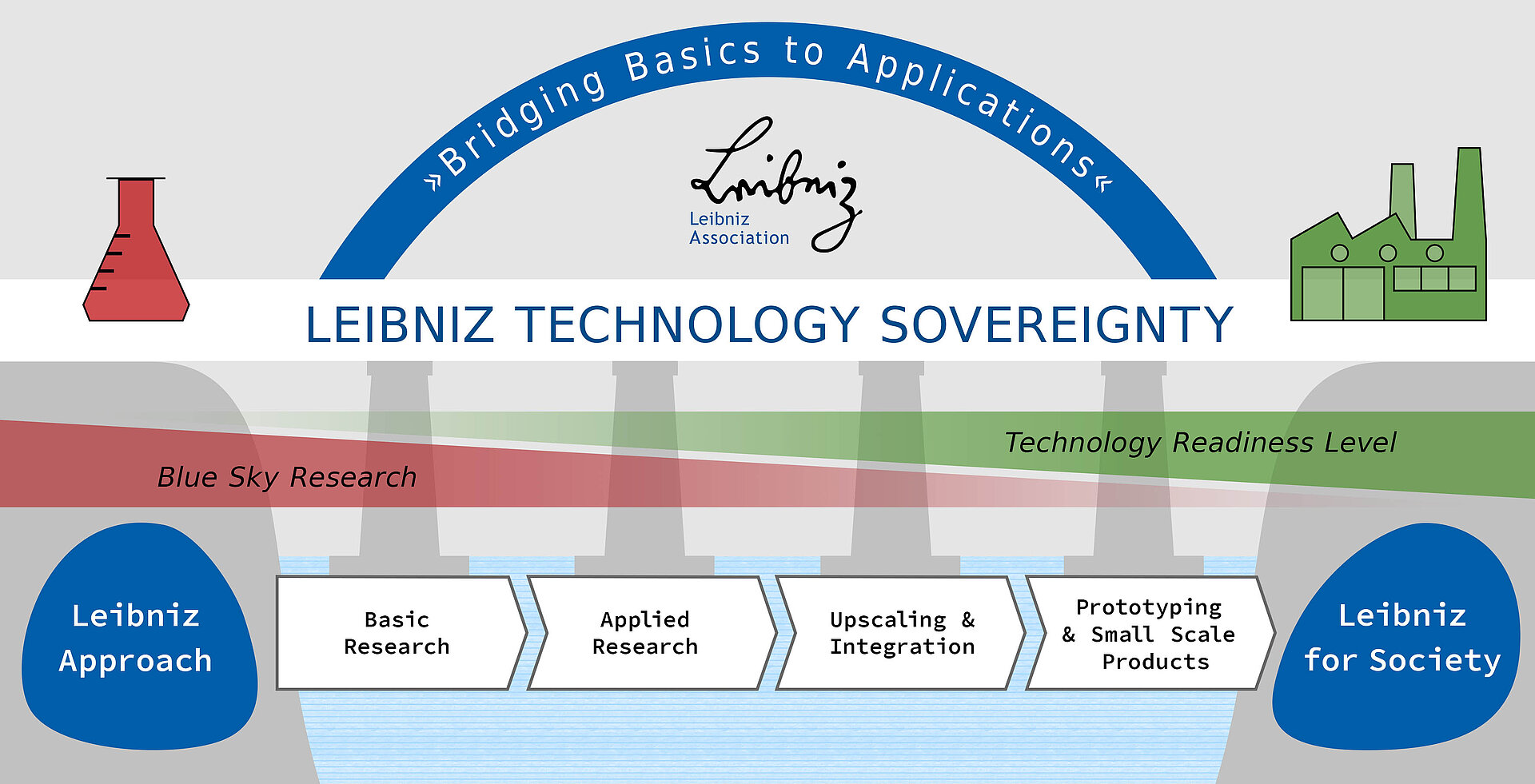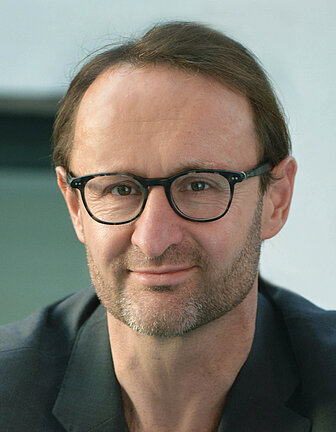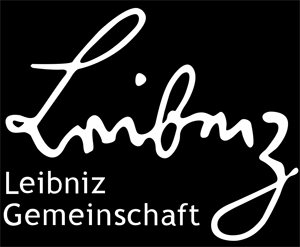Leibniz Strategy Forum “Technological Sovereignty”
Technological sovereignty has become one of the most important issues in innovation agendas and policies at both German and European levels. Today, it is clear that Europe must shape the development and application of new technologies internationally on an equal footing.
Institutions of the Leibniz Association have initiated the interdisciplinary Strategy Forum on technological sovereignty to bring the unique Leibniz perspective to this central topic area. To this end, they will develop interdisciplinary and holistic contributions of the Leibniz Association to solution concepts in strategically relevant key technological fields together with partners from science, industry and politics.
With the establishment of an administrative office under its supervision, IKZ assumes the coordinating and spokesperson functions in this process.
Information on the Strategy Forum on the website of the Leibniz Association

A wide range of technological solutions and corresponding know-how is available in the Leibniz Association. In accordance with the Leibniz motto "Theoria cum praxi", the R & D spectrum ranges from basic and applied research to (small-scale) prototypical solutions and small series (see blue highlighted part in Fig. 1, corresponds to TRL 1-7). The Leibniz Association thus contributes complementary expertise to universities, the other large non-university research organisations and industry; it therefore often assumes a linking function between the actors. In accordance with its mission statement, the Leibniz Association is particularly committed to the transfer of basic principles into applications by means of its transfer systematics.

For decades, globalization has been shaping the world economy; today, however, the risks posed by the resulting dependencies are becoming increasingly clear. Major industrial nations such as the USA, China, Japan, Korea, and India strive for stronger positions in high-tech fields that often represent central pillars of European added value and prosperity.
Technologies enable innovations and are crucial to solving global challenges such as climate change, digitalization, or public health. Therefore, preserving technological sovereignty in key technology fields is one of the most important foundations for the future competitiveness and economic independence of Germany and Europe. It should also ensure resilience, prosperity, and workplaces in the future, without jeopardizing common European values such as freedom, the rule of law, and sustainability.
The European Commission and the German government have placed technological sovereignty at the center of their innovation policies. The main approach here is to link as many necessary and important competencies as possible along the entire innovation and value chain.
Read more: Impetus of the Federal Ministery of Education and Research (BMBF) on technological sovereignity (German only)
In line with its guiding principle “Theoria cum praxi”, the R&D spectrum of the Leibniz institutes covers a significant part of the value chain: from basic and applied research to prototypes and small series. In addition, the Leibniz Institutes are highly interdisciplinary, which enables a holistic approach.
In this respect, the Leibniz Association complements the range of competencies of Germany's universities and other science organizations and thus assumes an important liaison function between various actors along the value chain.
The mission of the Leibniz Strategy Forum on technological sovereignty is to develop the contributions of Leibniz institutes to value chains in key technology fields together with partners from industry, science, and politics.
To identify strategically relevant technology fields, we follow the flagship initiatives formulated in the impulse paper of the Federal Ministry of Education and Research on technological sovereignty "Technologisch souverän die Zukunft gestalten" ("Shaping the Future with Technological Sovereignty"). In clusters of Leibniz institutes set up for this purpose, the essential segments of the corresponding value chain are linked together.
Decades of globalisation have led to a widespread loss of both crystal knowledge and actors with relevant expertise in academia and industry in Europe. Measures are therefore needed at both European and national level to restore the reliability of supply chains that have become fragile in the small but important field of crystal technology.
As a contribution to restoring strategic competitiveness in the EU, the TS Forum, together with the European Network on Crystal Growth (ENCG) and the Deutsche Gesellschaft für Kristallzüchtung & Kristallwachstum (DGKK), has produced a status analysis of scientific and industrial activities in the field of crystalline materials for electronics and photonics in the form of an interactive map. This map provides information from the public domain and enables the search and identification of individual partners in the crystal growth industry that are relevant to a specific scientific and technological interest. The interactive tool enables the analysis of missing components and competences to restore strategic competitiveness and stable supply chains in the EU in an efficient way. ENCG, DGKK, IKZ and interested stakeholders will subsequently work on consulting national and EU authorities on necessary measures to close the gaps in the European Research Area (ERA) in the areas of research, development and supply of supply-critical crystals.
If you have any questions or would like your institution to be included in the map, please write to:
Contact
Leibniz-Institut für Kristallzüchtung (IKZ)
https://www.ikz-berlin.de
Email: ENCG.interactive.mapikz-berlin.de
- TTopic Science Diplomacy:
- bmbf.de/bmbf/de/europa-und-die-welt/vernetzung-weltweit/bildungs-und-wissenschaftsdiplomatie/bildungs-und-wissenschaftsdiplomatie.html
- auswaertiges-amt.de/blob/2423206/a2086c45807120c7b5842ba5055649eb/201203-science-diplomacy-strategiepapier-data.pdf
(Science Diplomacy paper from the Federal Foreign Office on the expansion / defence of scientific freedoms)
- static.daad.de/media/daad_de/pdfs_nicht_barrierefrei/der-daad/220705_daad_awp-papier_perspektiven.pdf
(DAAD Perspectives: Foreign Science Policy for a Multipolar World) - Inflation Reduction Act Guidebook
- Report 2022 of the Expert Commission on Research and Innovation (EFI) on Germany's research, innovation and technological performance
- Report 2022 of the Expert Commission on Research and Innovation (EFI) on Germany's research, innovation and technological performance (abridged version)
Spokesperson

Press Releases
Events
22.05.2023
Konferenz „Handlungssicherheit in Forschungskooperationen mit China“
03.05.2023
InnoNation Festival
18.04.2023
Advanced Materials for
EU Open Strategic Autonomy
02.03.2023
VDI: Fachgespräch "Materialien für Quantentechnologien"
01.03.2023
Branchentag Photonik (SPECTARIS)
23.02.2023
INAM Kick Off Event 2023
02.12.2022, 15-18 Uhr
digital - Fachgespräch:
Open Science in Deutschland – Quo vadis?
16. / 17.05.2022
Fachkonferenz „Green Hydrogen for a Sustainable European Future“
30. / 31.05.2022:
China Day of the Leibniz Association
09.12.2021:
Leibniz meets Industry
30.11.2021, 16 Uhr:
Leibniz debattiert –
Technologische Souveränität * Videoaufzeichnung der Veranstaltung
05.11.2021 - Podiumsdiskussion:
zur Technologischen Souveränität in der Materialwissenschaft während der Berlin Science Week 2021 * Videoaufzeichnung der Veranstaltung
Clusters and contact persons
HEALTH TECHNOLOGIES
Prof. Dr. Jürgen Popp
Director
Leibniz Institute of Photonic Technology (IPHT)
Email juergen.poppipht-jena.de
ARTIFICIAL INTELLIGENCE
Prof. Dr. Sören Auer
Director
Leibniz Information Centre for Science and Technology (TIB)
Email Auertib.eu
MATERIALS FOR DIGITALISATION
Prof. Dr. Andreas Fery
Head of the Institute for Physical Chemistry and Polymer Physics
Leibniz-Institut für Polymerforschung Dresden e.V.
Email: feryipfdd.de
ECONOMIC AND SOCIAL SCIENCES
Prof. Dr. Dirk Dohse
Head of the Innovation and International Competition Research Center at the Kiel Institute for the World Economy (IfW Kiel)
E-Mail: Dirk.Dohse(at)ifw-kiel.de
QUANTUM TECHNOLOGIES
Prof. Dr. Bernd Büchner
Director
Leibniz Institute for Solid State Research
Email B.Buechnerifw-dresden.de
HYDROGEN ECONOMY
Prof. Dr. Matthias Beller
Director
Leibniz Institute for Catalysis e. V. at the University of Rostock (LIKAT)
EMail Matthias.Bellercatalysis.de
FUTURE COMMUNICATIONS
Prof. Dr. Gerhard Kahmen
Scientific Director
Leibniz Institute for High Performance Microelectronics(IHP)
Email kahmenihp-microelectronics.com

